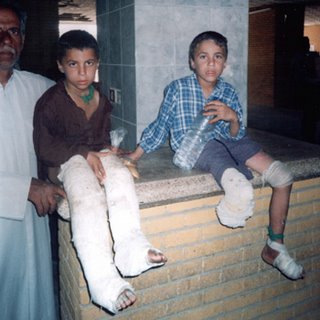
In an earlier post, Pat notes how far everyone is running from Iraq, including those who have been inclined to support it with vigor.
From Pat’s post:
“So what should be done? The worst part about this is that no one knows, and there is no right answer. Every road seems to lead to US embarrassment [sic], more Iraqi and coalition deaths, and chaos in the region.”
While there are indeed no easy answers, I would urge everyone to examine this proposal in Harper’s, written by George McGovern and William R. Polk.
A snippet:
"Withdrawal is not only a political imperative but a strategic requirement. As many retired American military officers now admit, Iraq has become, since the invasion, the primary recruiting and training ground for terrorists. The longer American troops remain in Iraq, the more recruits will flood the ranks of those who oppose America not only in Iraq but elsewhere.
Withdrawal will not be without financial costs, which are unavoidable and will have to be paid sooner or later. But the decision to withdraw at least does not call for additional expenditures. On the contrary, it will effect massive savings."
(Photo Credit: civilians.info/iraq)


4 comments:
Question for you Mike:
How will withdrawl STOP Iraq from being a training ground for terrorists?
Phil,
I'm not for the U.S. staying. I was against the war at the very start. I thought it would bring suffering to the Iraqis and it has.
The issue is that the "international force" McGovern mentions is no where close to set in stone, yet the withdrawl date he states clearly is. I believe we can NOT leave Iraq without establishing some hope for stability and order. We need either a strong Iraqi leader, a strong international force, or a compromise dividing the country amongst Sunnis, Shiites, and Kurds a la Biden.
My question posed to Mike still holds, and applies to any in favor of unconditional withdrawl.
Jeff,
Our presence creates terrorism. By staying we are making a bad problem worse.
The problem with yourquestion is that it implies that staying is a better than leaving -- but the reality is, both will cause harm, the latter causing less harm.
But while we are aksing incredibly unfair questions here is one for you: how long are you willing to wait and see if we can provide stability in Iraq? Five more years? ten? How many more deaths are acceptable?
And will you sign up and fight this battle, since you think it is worthwhile to stay?
You say we must stay until we can create stability -- but is there any evidence that suggests we will be able to?
Maybe if had a Powell doctrine style increase in troops, which is not an option anyway.
And what defines success? Is staying in Iraq for three more years? Which wouldresult, perhaps in the the deaths of thousands of more Americans and coutnless Iraqis, not to mention the unceasing destruction to the infrastructure,and the wasted billions of dollars which could be used for so many things (as McGovern so ably points out, could be used to reimburse Iraqis who have lost loved ones.
Could we possibly define that as a sucess?
It is rea nice to say: "We broke it, we have to fix it." But in reality, we broke it, and we are breaking it more and more by staying, and the longer we stay the worse it will be.
But hey, if you think our presence is a good thing, than thats what you believe. I just cannot possibly fathom what leads you to this conclusion.
Mike,
Staying creates anti-American terrorism, that's certainly true. However, leaving would allow the flourishment of sectarian terrorism. Civilians would die at the hands of politically motivated factions at a heavily increased rate. Then again, it's getting to the point where we can't seem to stop much of that anyways, so maybe you're right.
Btw, I don't think we should stay. I'm not sure what gave you that impression. If it were up to me right now we'd be on our knees at the UN begging for help so we can get out of there.
Post a Comment